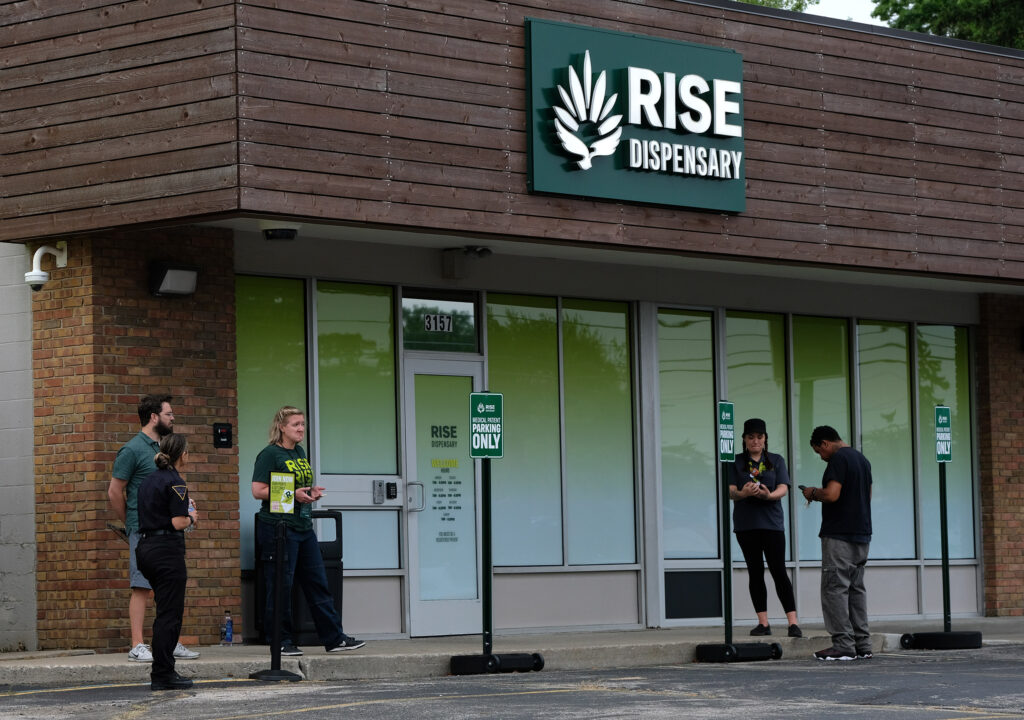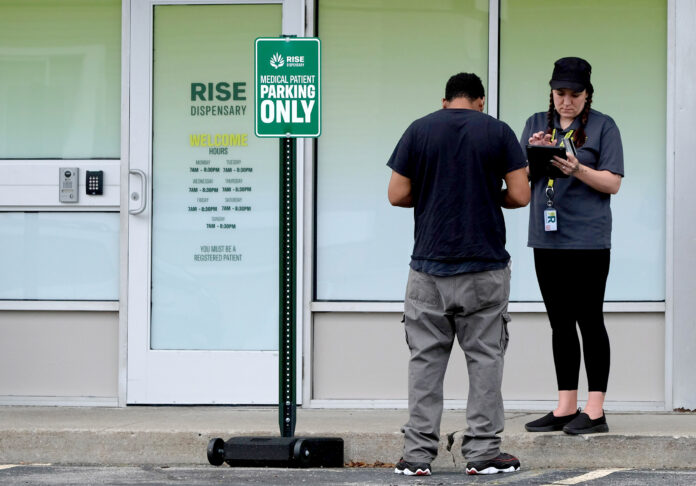Ohio leads revolution against federal prohibition
TOLEDO – Ohio begins recreational marijuana sales today, marking a significant shift in the state’s cannabis landscape following last November’s voter approval for adult-use cannabis. Dispensaries statewide are set to serve recreational consumers, including right here in Toledo and Bowling Green.
One of the dispensaries, Nectar Dispensary in Bowling Green, has spent the past two months preparing for this day by hiring and training staff and stocking up on a very extensive menu and back stock, according to Zachary Gergich, the store’s designated representative.
Gergich said he is expecting a big rush because “a lot of people are excited and have been waiting for this day, especially since it’s been almost 10 months since we we’re able to vote on it. People have been waiting for a while, and I definitely think there’s going to be a big push tomorrow.
“We’re making history … it’s going to be the first day of sales in Ohio for recreational customers I think a lot of people want to be part of history,” he said.
Nectar, which has been open for medical cannabis since March 2023 and receives its product from Ohio, currently has three Nectar stores in Ohio and three more on the way.

The legalization of cannabis in the United States represents a unique and historical chapter in human history. Unlike any previous prohibition, the shift from illegal to legal status for cannabis is characterized by a gradual, state-by-state approach rather than a sweeping federal mandate. This piecemeal legalization has allowed the U.S. to become a leader in cannabis innovation, positioning itself for global dominance in the burgeoning market.
The federal government’s decision to let states act as laboratories of democracy has fostered diverse legal and business models, driving significant advancements in cultivation, distribution and regulation.
According to Lenny Berry, founder and CEO of the Ohio Cannabis Health and Business Summit, “this is an historic mark for everybody who’s been fighting to legalize it and destigmatize the plant for patients who use it and have been shunned.

“I also think it gives consumers or people who were curious about the plant an opportunity to venture into the space or inquire about it without feeling a certain kind of way or needing a medical card,” he said.
“I just felt like there was a lot of misinformation while we were trying to pass legalization, and I always feel like the educated person is the best voter, because if you don’t know about the industry, you’ll feel apprehensive about putting your best foot forward to try to make it happen,” he explained.
“It’s a great way to celebrate being the 24th legal state, for us to hit that milestone and get across the finish line, especially when you’re talking about Ohio businesses losing to Michigan,” Berry said. “That was a big thing. The prices may not be as low as Michigan but I think now that we have a legal market, we will keep a lot of consumers here in the state, like tax dollars, job creation, and the list goes on.
In the grand scheme of things, I think the Ohio economy is going to get a major shot in the arm.
Lenny Berry,
Ohio, the 24th state to sell recreational cannabis, is part of a growing revolt against federal cannabis prohibition, joining other states in challenging outdated federal restrictions by establishing its own cannabis policies. This state-led movement underscores a broader shift towards recognizing cannabis as a legitimate economic and social asset. By legalizing cannabis, Ohio asserts its right to innovate and lead in this rapidly evolving industry, setting an example for other states to follow.
The new law allows adults to buy and possess up to 2.5 ounces (70 grams) of cannabis and to grow up to six plants per individual or 12 plants per household at home.
Cannabis is uniquely positioned as a product with both recreational and therapeutic applications, setting it apart from other substances. While alcohol commands a $1.6 trillion annual market, cannabis also taps into the pharmaceutical sector, particularly in areas like anti-inflammatory treatments.
The global market for anti-inflammatory drugs is substantial, valued at approximately $104 billion in 2022 and projected to grow significantly. Cannabis’s potential impact on these markets, though not entirely replacing them, could alter consumer choices and industry dynamics.
Ohio’s entry into the recreational cannabis market impacts local and regional economies, particularly border cities like Toledo and Detroit. Michigan has benefited significantly from Ohioans purchasing cannabis across state lines. According to New Frontier Data, Michigan’s cannabis sales reached over $3 billion in 2023, a 30 percent increase from 2022. However, the precise contribution of Ohioans to Michigan’s sales remains unclear.
Ohio’s legalization may also influence neighboring states like Kentucky, Indiana, Pennsylvania and West Virginia by encouraging policy changes and affecting local economies as residents travel to Ohio for cannabis purchases.

The legalization of recreational cannabis in Ohio could alter the flow of cannabis and related money across state lines. Ohioans who previously traveled to Michigan for cannabis may now spend locally, impacting Michigan’s sales and Ohio’s economic landscape. Additionally, changes in consumer behavior could influence the flow of cannabis-related money, as Ohio retains more revenue within its borders. This shift might prompt neighboring states to reconsider their cannabis policies to prevent economic losses.
Ohio’s medical cannabis sales in 2023 were $484.4 million, a slight one percent increase from 2022. The market faces challenges, including a decline in registered medical marijuana patients by nearly 8 percent since the November 2023 election. Ohioans spent over $700 million on cannabis in Michigan in 2023 due to lower prices and quality concerns in Ohio’s market. The anticipation of today’s recreational sales launch may also have affected the medical market.
New Frontier data forecasts Ohio’s marijuana sales to potentially hit $2.8 billion by 2030.
Ohio’s legalization of recreational marijuana sales marks a new era of economic opportunity and political discourse. By fostering a competitive environment and learning from states like Michigan, Ohio can position itself as a leader in the cannabis industry. With projections indicating significant growth, Ohio’s market dynamics and strategic policies will shape the future of cannabis legalization in the region and beyond.










